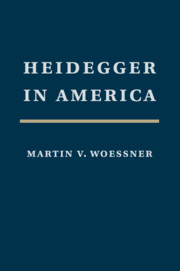Book contents
- Frontmatter
- Contents
- Preface
- Introduction: Being Here
- 1 Freiburg Bound
- 2 Exiles and Emissaries
- 3 Nihilism, Nothingness, and God
- 4 An Officer and a Philosopher
- 5 Dasein and das Man
- 6 The Continental Divide
- 7 Richard Rorty and the Riddle of the Book that Never Was
- 8 Ethics, Technology, and Memory
- 9 Culture Wars
- Conclusion: Being There
- Index
- References
5 - Dasein and das Man
Heidegger and American Popular Culture
Published online by Cambridge University Press: 04 February 2011
- Frontmatter
- Contents
- Preface
- Introduction: Being Here
- 1 Freiburg Bound
- 2 Exiles and Emissaries
- 3 Nihilism, Nothingness, and God
- 4 An Officer and a Philosopher
- 5 Dasein and das Man
- 6 The Continental Divide
- 7 Richard Rorty and the Riddle of the Book that Never Was
- 8 Ethics, Technology, and Memory
- 9 Culture Wars
- Conclusion: Being There
- Index
- References
Summary
Heidegger: Worrywart.
Newsweek“What a great philosopher, saying shit like that!” So exclaims Dwight Wilmerding, the twenty-something slacker protagonist of Benjamin Kunkel's debut novel, Indecision. The improbably named Wilmerding is referring to the fictional philosopher Otto Knittel, author of the forbidding – and equally fictitious – The Uses of Freedom, “or Der Gebrauch der Freiheit if you're German.” Wilmerding, a former philosophy major, is an avid, if slow – “I read the book at maybe two pages an hour” – reader of Knittel, though what he gets out of the experience is not entirely clear. What is clear, or clearly implied, is that reading Knittel is no cakewalk, and anyone who pries open one of his books for pleasure is more intelligent than his cubicle-confined day job would suggest. Wilmerding may be chronically indecisive, which is the conceit of Indecision's plot, but he's got a brain. He just doesn't know how to use it.
Otto Knittel is so obviously a spoof of Heidegger that when Kunkel admits as much in the acknowledgements at the end of his novel, it does not come as much of a surprise. After all, we had already been told by Wilmerding that Knittel “was way into forests,” that his major work was a “very deathocentric book,” and that “the category of choice” was the cornerstone of his philosophy (something Wilmerding obviously failed to apply to his life). All these are defining features of Heidegger (or at least the slightly mythic persona Heidegger tried to create for himself).
- Type
- Chapter
- Information
- Heidegger in America , pp. 160 - 180Publisher: Cambridge University PressPrint publication year: 2010

